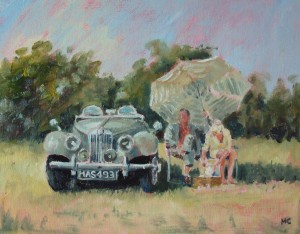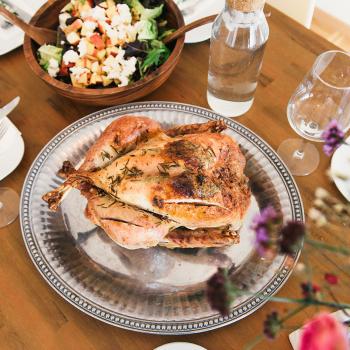 A few leaves are still hanging on the trees, but my yard is so covered that you cannot see grass; most of my neighbors have leaf piles along the street as high as a five-year-old. All day and all evening for the next few weeks, somewhere within hearing, leaf blowers wail. This morning the air was so cold it made my face hurt as I walked across campus. My brother Vaughn’s birthday is two weeks from today. He will be forty-seven.
A few leaves are still hanging on the trees, but my yard is so covered that you cannot see grass; most of my neighbors have leaf piles along the street as high as a five-year-old. All day and all evening for the next few weeks, somewhere within hearing, leaf blowers wail. This morning the air was so cold it made my face hurt as I walked across campus. My brother Vaughn’s birthday is two weeks from today. He will be forty-seven.
I read a post on Vaughn’s Facebook page the other day, bemoaning the fact that it is time to winterize his hobby cars. He wrote, “What a sad, sad way to spend a beautiful Sunday afternoon. I prepped the MG for the long cold winter.”
Cars are one of his hobbies. He has the MG, he has a red Autsin Healey, and he recently sold an antique VW Beetle. All of them are convertibles.
Vaughn drives his cars to antique car shows, whereas many haul their cars along on trailers to keep them pristine. At these shows, he stands around with men twenty and thirty years his senior, shooting the shit. When we were young, Vaughn and I shared a love for soccer, tennis, and beer. These three loves are no longer options for him.
He has some very nice cars. He also has Wegener’s granulomatosis. Never heard of it? We hadn’t either. The doctors in his hometown had not seen a case of it in over ten years. They didn’t know to look for it when he came in with respiratory problems accompanied by sudden arthritis. They misdiagnosed several times over.
Wegener’s granulomatosis—which is now being called granulomatosis with polyangiitis (GPA), because apparently Dr. Wegener might have been affiliated with the Nazis—if not treated immediately and vigorously, destroys your kidneys, compromises your lungs and upper respiratory tract. It restricts blood flow to your extremities so gangrene sets in; you have to get the ends of your fingers, along with the fingernails, carved away to save your hands. At least that’s what happened in Vaughn’s case.
The disease has to be in remission—you’re never cured, just in remission and watching for it to return—before you can start looking for a donor kidney. Vaughn has had two transplants so far, one from one of our sister’s best friends, one from his wife. Two matching donors so willing and so close is a miracle in itself. Here’s the thing about the donor kidney though: either your body rejects it and destroys it fast, or you take anti-rejection medication, which destroys it slowly. Either way, its days are numbered.
That is why, when I read this Facebook post he had dashed off, it was more than a little poignant. While no one has any guarantees, some are much closer to the brute fact we all try to ignore: not everyone’s winter will be followed by spring.
This reality places itself in Vaughn’s face every day—when he takes his pill cocktails, when he goes for his regular checkups, when his legs swell until they look like they will burst open. It would be understandable if he became obsessed with the suffering, with the disease, how it has destroyed his health.
We grew up hearing in church that this old sin-sick world was a bad and ugly place, that pain and suffering were our reasonable lot in life. In special Thanksgiving services, the congregation was given a chance to stand and proclaim what they were thankful for. It was not uncommon for the hour to descend into one litany of woes after another, with thanks to God for giving strength to cope tacked onto the end of each. The theme of the entire service became not thankfulness at all, but suffering.
It only made sense. We were taught that it was only going to get worse until Jesus came and swept up believers—and we could at least take some small comfort in knowing that once we were gone, those left behind would suffer more.
Reading Camus years later, I sensed the same weariness with a world of suffering. Though he was not waiting for Jesus to sweep him away, his was the same lament: the world is a hard and painful place; why stick around any longer than you have to.
Vaughn’s not having any of the whining. Even though his existence now swings between discomfort and all-out pain, he is living, and for all I can tell, he is enjoying this world. His attitude is closer to Robert Jordon, Hemingway’s protagonist in For Whom the Bell Tolls, who, as he stares at his imminent death, concludes, “The world is a fine place and worth fighting for and I hate very much to leave it.”
This past summer Vaughn and his son drove down in the MG to visit. From the living room I saw the little green car coming up the road with the top down, flashing in and out of overhanging-tree shade. He eased the car onto the driveway and pulled up. I opened the door to the house and waved. His son waved. In my memory, Vaughn is wearing fingerless, leather driving gloves, but I don’t think he actually was. He looked up in his sunglasses, behind the wheel of his new toy, and gave me a proud flat smile.
Vic Sizemore earned his MFA in fiction from Seattle Pacific University in 2009. His fiction and nonfiction are published or forthcoming in Story Quarterly, Southern Humanities Review, PANK Magazine, Pembroke, Saint Katherine Review, Rock & Sling and elsewhere. An excerpt from his novel The Calling was a finalist for the Sherwood Anderson Award; other excerpts from The Calling are published in Portland Review and are forthcoming serially in Connecticut Review. His short story “Hush Little Baby” won the 28th New Millennium Writings Award for Fiction. Sizemore teaches at Central Virginia Community College.











